- Home
- Tom Stoppard
Travesties
Travesties Read online
TRAVESTIES
WORKS BY TOM STOPPARD
PUBLISHED BY GROVE PRESS
Every Good Boy Deserves Favor and Professional Foul
Jumpers
The Real Inspector Hound and Other Plays
Rosencrantz and Guildenstern Are Dead
Travesties
The Invention of Love
TRAVESTIES
TOM STOPPARD
Copyright © 1975 by Tom Stoppard
All rights reserved. No part of this book may be reproduced in any form or by any electronic or mechanical means, or the facilitation thereof, including information storage and retrieval systems, without permission in writing from the publisher, except by a reviewer, who may quote brief passages in a review. Any members of educational institutions wishing to photocopy part or all of the work for classroom use, or publishers who would like to obtain permission to include the work in an anthology, should send their inquiries to Grove/Atlantic, Inc., 841 Broadway, New York, NY 10003.
CAUTION: Professionals and amateurs are hereby warned that Travesties is subject to a royalty. It is fully protected under the copyright laws of the United States, Canada, United Kingdom, and all British Commonwealth countries, and all countries covered by the International Copyright Union, the Pan-American Copyright Convention, and the Universal Copyright Convention. All rights, including professional, amateur, motion picture, recitation, public reading, radio broadcasting, television, video or sound taping, all other forms of mechanical or electronic reproduction, such as information storage and retrieval systems and photocopying, and rights of translation into foreign languages, are strictly reserved.
First-class professional applications for permission to perform it, and those other rights stated above, must be made in advance to Peters Fraser & Dunlop, Drury House, 34-43 Russell Street, London WC2B 5HA, England.
Stock and amateur applications to perform it, and those other rights stated above, must be made in advance, before rehearsals begin, with Samuel French, Ltd., 45 West 25th Street, New York, NY 10010.
Printed in the United States of America
Library of Congress Catalog Card Number 75-13552
eBook ISBN-13: 978-0-8021-9532-6
Grove Press
an imprint of Grove/Atlantic, Inc.
841 Broadway
New York, NY 10003
Distributed by Publishers Group West
www.groveatlantic.com
09 10 11 12 13 14 15 30 29 28 27 26 25 24
For Oliver, Barnaby,
William and Edmund
The first performance of Travesties took place at the Aldwych Theatre, London, on 10 June 1974 in a production by the Royal Shakespeare Company. The cast was as follows:
HENRY CARR
John Wood
TRISTAN TZARA
John Hurt
JAMES JOYCE
Tom Bell
LENIN
Frank Windsor
BENNETT
John Bott
GWENDOLEN
Maria Aitken
CECILY
Beth Morris
NADYA
Barbara Leigh-Hunt
The play was directed by Peter Wood, and designed by Carl Toms with lighting by Robert Ornbo.
Travesties was revived by the Royal Shakespeare Company at the Barbican, London, on 16 October 1993 with the following cast:
HENRY CARR
Antony Sher
TRISTAN TZARA
David Westhead
JAMES JOYCE
Lloyd Hutchinson
LENIN
Geoffrey Freshwater
CECILY
Amanda Harris
GWENDOLEN
Rebecca Saire
BENNETT
Trevor Martin
NADYA
Darlene Johnson
Director
Adrian Noble
Designer
Richard Hudson
Lighting
Jennifer Tipton
Music
Guy Woolfenden
The text printed in this edition incorporates revisions made by the author for the above production.
Characters
HENRY CARR appears as a shabby and very old man and also as his youthful elegant self.
TRISTAN TZARA is the Dadaist of that name. He was a short, dark-haired, very boyish-looking young man, and charming (his word). He wears a monocle.
JAMES JOYCE is James Joyce in 1917/18, aged 36. He wears a jacket and trousers from two different suits.
LENIN is Lenin in 1917: aged 47.
BENNETT is Carr’s manservant. Quite a weighty presence.
GWENDOLEN is Carr’s younger sister; young and attractive but also a personality to be reckoned with.
CECILY is also young and attractive and even more to be reckoned with. Also appears as her old self.
NADYA is Nadezhda Krupskaya, Lenin’s wife: aged 48.
Henry Wilfred Carr, 1894–1962
The reader of a play whose principal characters include Lenin, James Joyce and Tristan Tzara may not realize that the figure of Henry Carr is likewise taken from history. But this is so.
In March 1918 (I take the following information from Richard Ellmann’s James Joyce), Claud Sykes, an actor temporarily living in Zurich, suggested to Joyce that they form a theatrical company to put on plays in English. Joyce agreed, and became the business manager of The English Players, the first production to be that of The Importance of Being Earnest. Actors were sought.
Professionals were to receive a token fee of 30 francs and amateurs to make do with 10 francs for tram fare to rehearsals. Joyce became very active and visited the Consul General, A. Percy Bennett, in order to procure official approval for the Players. He succeeded in this, despite the fact that Bennett ‘was annoyed with Joyce for not having reported to the Consulate officially to offer his services in wartime, and was perhaps aware of Joyce’s work for the neutralist International Review and of his open indifference to the war’s outcome. He may even have heard of Joyce’s version of Mr Dooley, written about this time …’ – I quote from Ellmann’s superb biography, whose companionship was not the least pleasure in the writing of Travesties.
Meanwhile, Sykes was piecing together a cast … ‘An important find was Tristan Rawson, a handsome man who had sung baritone roles for four years in the Cologne Opera House but had never acted in a play. After much coaxing Rawson agreed to take on the role of John Worthing. Sykes recruited Cecil Palmer as the butler, and found a woman named Ethel Turner to play Miss Prism … As yet, however, there was no one to take the leading role of Algernon Moncrieff. In an unlucky moment Joyce nominated a tall, goodlooking young man named Henry Carr, whom he had seen in the consulate. Carr, invalided from the service, had a small job there. Sykes learned that he had acted in some amateur plays in Canada, and decided to risk him.’
Carr’s performance turned out to be a small triumph. He had even, in his enthusiasm, bought some trousers, a hat and a pair of gloves to wear as Algernon. But immediately after the performance the actor and the business manager quarrelled. Joyce handed each member of the cast 10 or 30 francs, as prearranged, but succeeded in piquing Carr, who later complained to Sykes that Joyce had handed over the money like a tip.
The upshot was disproportionate and drawn out. Joyce and Carr ended up going to law, in two separate actions, Carr claiming reimbursement for the cost of the trousers, etc., or alternatively a share of the profits, and Joyce counter-claiming for the price of five tickets sold by Carr, and also suing for slander. These matters were not settled until February 1919. Joyce won on the money and lost on the slander, but he reserved his full retribution for Ulysses, where ‘he allotted punishments as scrupulously and inexorably as Dante … Originally Joyce intended to make C
onsul General Bennett and Henry Carr the two drunken, blasphemous and obscene soldiers who knock Stephen Dedalus down in the “Circe” episode; but he eventually decided that Bennett should be the sergeant-major, with authority over Private Carr, who, however, refers to him with utter disrespect.’
From these meagre facts about Henry Carr – and being able to discover no others – I conjured up an elderly gentleman still living in Zurich, married to a girl he met in the Library during the Lenin years, and recollecting, perhaps not with entire accuracy, his encounters with Joyce and the Dadaist Tzara.
Soon after the play opened in London I was excited and somewhat alarmed to receive a letter beginning, ‘I was totally fascinated by the reviews of your play – the chief reason being that Henry Carr was my husband until he died in 1962.’ The letter was from Mrs Noël Carr, his second wife.
From her I learned that Henry Wilfred Carr was born in Sunderland in 1894 and brought up in County Durham. He was one of four sons, including his twin Walter, now also dead. At 17 Henry went to Canada where he worked for a time in a bank. In 1915 he volunteered for military service and went to France with the Canadian Black Watch. He was badly wounded the following year and – after lying five days in no-man’s-land – was taken prisoner. Because of his wounds Henry was sent by the Germans to stay at a monastery where the monks tended him to a partial recovery, and then as an ‘exchange prisoner’ he was one of a group who were sent to Switzerland.
Thus Henry Carr arrived in Zurich where he was to cross the path of James Joyce and find himself a leading actor in both onstage and offstage dramas, leading to immortality of a kind as a minor character in Ulysses.
It was in Zurich, too, that he met his first wife, Nora Tulloch. They married in England after the war and later he took her back to Canada where he found a job in a department store in Montreal. He rose within the organization to become company secretary.
In 1928, while in Montreal, he met Noël Bach and after his divorce they were married there in 1933. The following year they returned to England. Henry ultimately joined a foundry company and when the next war came he and his wife were living in Sheffield. They were bombed out, and moved to a Warwickshire village, where Henry commanded the Home Guard, and they stayed in Warwickshire in the post-war years.
In 1962, while he was on a visit to London, Henry had a heart attack, and he died in St Mary Abbots Hospital, Kensington. He had no children.
I am indebted to Mrs Noël Carr for these biographical details, and, particularly, for her benevolence towards me and towards what must seem to her a peculiarly well-named play.
T.S.
Acknowledgements
Nearly everything spoken by Lenin and Nadezhda Krupskaya herein comes from his Collected Writings and from her Memories of Lenin. I have also profited variously – and gratefully – from the following books: Lenin by Michael C. Morgan; Lenin by Robert Payne; Lenin and the Bolsheviks by Adam B. Ulam; To The Finland Station by Edmund Wilson; Days With Lenin by Maxim Gorki; The First World War, an Illustrated History by A. J. P. Taylor; James Joyce by Richard Ellmann; Joyce by John Gross; Dada, Art and Anti-Art by Hans Richter; and The Dada Painters and Poets, edited by Robert Motherwell. I am also indebted to Mr James Klugmann for material relating to Lenin in Switzerland. The responsibility for the use to which this and all other material is put is my own.
ACT ONE
The play is set in Zurich, in two locations: the drawing room of Henry Carr’s apartment (‘THE ROOM’), and a section of the Zurich Public Library (‘THE LIBRARY’). Most of the action takes place within Carr’s memory, which goes back to the period of the First World War, and this period is reflected appropriately in the design and the costumes, etc. It is to be supposed that Old Can has lived in the same apartment since that time.
The ROOM must have the main door Centre Upstage: most of the entrances would be weakened seriously if they occuned from the side. Double doors would be best. However, there is also at least one side door. There is a centre table with a good chair on each side, and a side table, apart from other furniture.
The LIBRARY suggests a larger scale – tall bookcases, etc. In Act Two Cecily (the librarian) requires a counter or desk, which need not necessarily be in view at the beginning of the play. Some of the entrances, e.g. Nadya’s, are probably through a door rather than from the wings.
The LIBRARY in the Prologue and the Second Act does not necessarily have to be presented from the same angle.
We begin in the LIBRARY
There are places for JOYCE, LENIN and TZARA.
GWEN sits with JOYCE. They are occupied with books, papers, pencils …
LENIN is also writing quietly, among books and papers, TZARA is writing as the play begins. On his table are a hat and a large pair of scissors, TZARA finishes writing, then takes up the scissors and cuts the paper, word by word, into his hat. When all the words are in the hat he shakes the hat and empties it on the table. He rapidly separates the bits of paper into random lines, turning a few over, etc., and then reads the result in a loud voice.
TZARA: Eel ate enormous appletzara
key dairy chef’s hat he’ll learn oomparah!
Ill raced alas whispers kill later nut east,
noon avuncular ill day Clara!
CECILY (Entering): Sssssssh!
(Her admonition is to the Library in general. She enters from one wing, not through the door, and crosses the stage, leaving by the opposite wing, moving quite quickly, like someone who is busy. No one takes any notice.)
JOYCE (Dictating to GWEN): Deshill holles eamus …
GWEN (Writing): Deshill holles eamus …
JOYCE: Thrice.
GWEN: Uh-hum.
JOYCE: Send us bright one, light one, Horhorn, quickening and wombfruit.
GWEN: Send us bright one, light one, Horhorn, quickening and wombfruit.
JOYCE: Thrice.
GWEN: Uh-hum.
JOYCE: Hoopsa, boyaboy, hoopsa!
GWEN: Hoopsa, boyaboy, hoopsa!
JOYCE: Hoopsa, boyaboy, hoopsa!
GWEN: Likewise thrice?
JOYCE: Uh-hum.
(By this time TZARA has replaced the bits of paper into the hat. He takes out a handful, and reads the words one at a time, placing them into the hat as he reads each one.)
TZARA: Clara avuncular!
Whispers ill oomparah!
Eel nut dairy day
Appletzara …
… Hat!
CECILY (Re-entering): Ssssssh!
(CECILY has come in with a few books which she places by LENIN.)
(TZARA leaves the Library through the door.)
(It is now necessary that the audience should observe the following: GWEN has received from JOYCE a folder. CECILY receives an identical folder from LENIN. These folders, assumed to contain manuscripts, are eye-catching objects in some striking colour. Each girl has cause to place her folder down on a table or chair, and each girl then picks up the wrong folder. In the original production, GWEN dropped a glove, etc., etc., but it is not important how this transference is achieved, only that it is seen to occur.)
(GWEN is now ready to leave the Library, and does so, taking Lenin’s folder with her.)
(CECILY also leaves, not through the door but into the wings.)
(NADYA enters as GWEN leaves; they bump into each other, and each apologizes, GWEN in English, NADYA in Russian.)
(NADYA enters in an agitated state. She looks round for her husband and goes straight to him. Their conversation is in Russian.)
NADYA: Vylodya!
LENIN: Shto takoya? (What is it?)
NADYA: Bronsky prishol. On s’kazal shto v’Peterburge revolutsia!
(Bronsky came to the house. He says there’s a revolution in St Petersburg.)
LENIN: Revolutsia!
(At this point JOYCE stands up and begins to walk up and down searching his pockets for tiny scraps of paper on which he has previously written down things he may wish to use. While the Lenins continu
e their conversation, JOYCE fishes out, one by one, these scraps of paper and reads out what he finds on them.)
JOYCE (Regarding his first find): ‘Morose delectation … Aquinas tunbelly … Frate porcospino …’
(He decides he doesn’t need this one. He screws it up and throws it away, and finds a second …)
‘Und alle Schiffe brucken …’
(He decides to keep this one, so re-pockets it. He takes out another.)
‘Entweder transubstantiality, oder consubstantiality, but in no way substantiality…’
(He decides to keep this one as well. Meanwhile, the LENINS have been continuing in the following manner):
LENIN: Otkuda on znayet? (How does he know?)
NADYA: Napisano v’Gazetakh. On govorit shto Tsar sobiraet’sia otretchsya ot prestola! (It’s all in the papers. He says the Tsar is going to abdicate!)
LENIN: Shtoty! (No!)
NADYA: Da! (Yes!)
LENIN: Eto v’gazetakh? (Is that in the newspapers?)
NADYA: Da – da. Idiom damoi. On zhdyot. (Yes – yes. Come on home. He’s waiting.)
LENIN: On tam? (Is he there?)
NADYA: Da! (Yes!)
LENIN: Gazetakh u nievo? (He brought the paper?)
NADYA: Da! (Yes!)
LENIN: Ty sama vidyela? (You saw it yourself)
NADYA: Da, da, da! (Yes, yes, yes!)
(JOYCE’s voice, however, has dominated this passage. He now encounters a further scrap of paper which is lying on the floor: LENIN has inadvertently dropped it. JOYCE picks this paper up. NADYA is leaving the Library, through the door, LENIN saying in Russian …)
LENIN: Idyi nazad y skazhee y’moo shto ya prichazhoo. Tolka sobieru svayi b’magi. (Go home ahead of me. I will collect my papers and follow.)
(LENIN is gathering his papers. JOYCE is examining the dropped paper.)

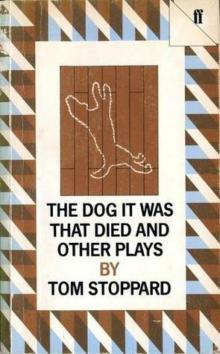 The Dog It Was That Died and Other Plays
The Dog It Was That Died and Other Plays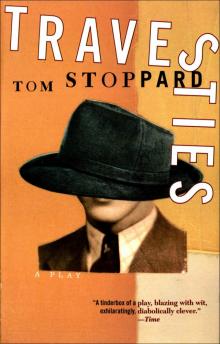 Travesties
Travesties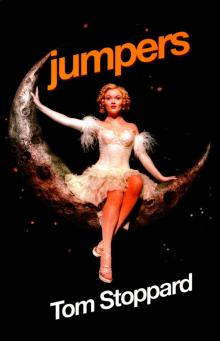 Jumpers
Jumpers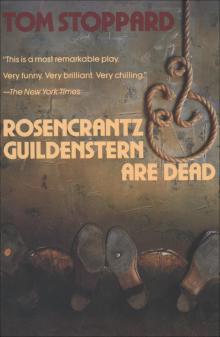 Rosencrantz and Guildenstern Are Dead
Rosencrantz and Guildenstern Are Dead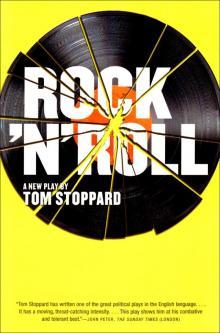 Rock 'N' Roll
Rock 'N' Roll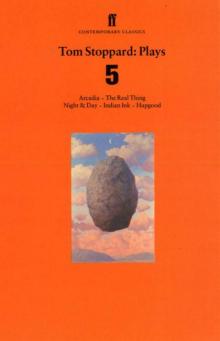 Plays 5
Plays 5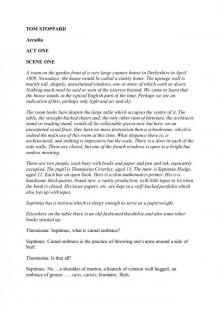 Arcadia
Arcadia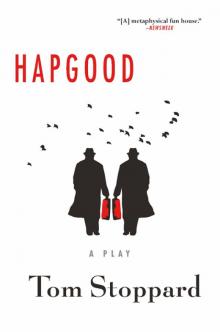 Hapgood
Hapgood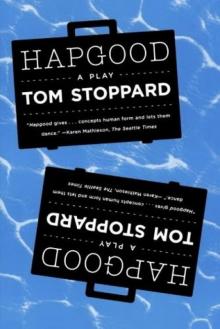 Hapgood: A Play
Hapgood: A Play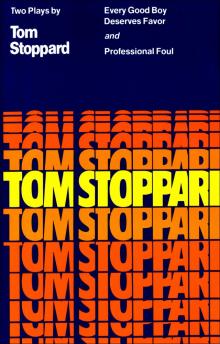 Every Good Boy Deserves Favor & Professional Foul
Every Good Boy Deserves Favor & Professional Foul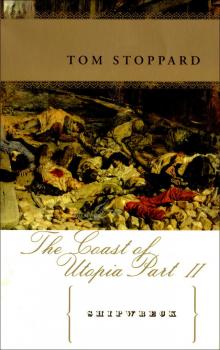 The Coast of Utopia: Voyage, Shipwreck, Salvage
The Coast of Utopia: Voyage, Shipwreck, Salvage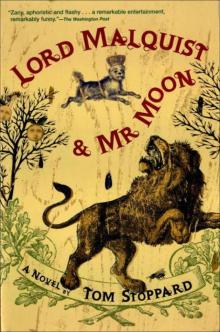 Lord Malquist & Mr. Moon
Lord Malquist & Mr. Moon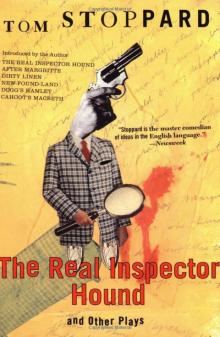 The Real Inspector Hound and Other Plays
The Real Inspector Hound and Other Plays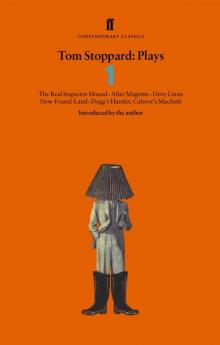 Tom Stoppard Plays 1
Tom Stoppard Plays 1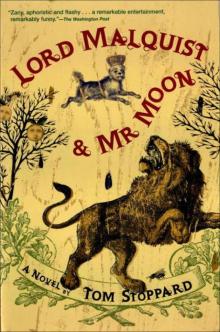 Lord Malquist & Mr. Moon: A Novel
Lord Malquist & Mr. Moon: A Novel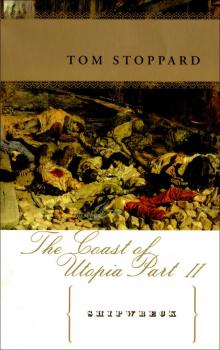 Shipwreck
Shipwreck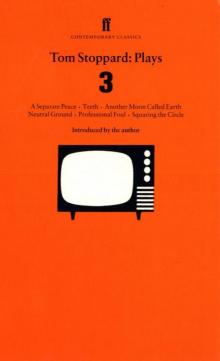 Tom Stoppard Plays 3
Tom Stoppard Plays 3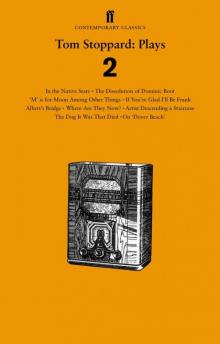 Tom Stoppard Plays 2
Tom Stoppard Plays 2 Rosencrantz and Guildenstern are dead. Arcadia
Rosencrantz and Guildenstern are dead. Arcadia